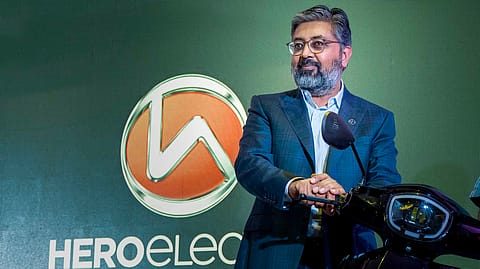There will be a logical conclusion to FAME II disputes: Naveen Munjal
Hero Electric is among the electric two-wheeler makers the government has pulled up for the “misappropriation” of FAME-II subsidies

Disputes regarding the localisation levels of electric two-wheelers, which qualify for Faster Adoption and Manufacturing of Electric Vehicles (FAME-II) will imminently reach a logical conclusion, and it will not be a long-term issue, Naveen Munjal, managing director, Hero Electric, tells Fortune India. “There will be some enhancements (to the FAME-II policy) which will be done; some discussions which will be done, and eventually there will be some kind of a rationale…a logical conclusion which we will arrive at, and the market will bounce back. So, I don’t anticipate this to be a long-term issue,” he says on the sidelines of the company’s launch event of three new scooters—the new Optima CX5.0 (Dual Battery), Optima CX2.0 (Single Battery), and NYX (Dual Battery).
To the uninitiated, Hero Electric is among the electric two-wheeler makers the government has pulled up for the “misappropriation” of FAME-II subsidies. Currently, only those OEMs, which use 50% locally-sourced components qualify for FAME-II subsidies. Munjal claims the likes of Hero Electric are yet to see light at the end of the tunnel pertaining to disputes arising from these alleged violations. “Nothing is behind us right now. There is no decision at this point on how this is going to pan out and what is going to happen. The government is evaluating…,” he says.
Munjal believes that policies like the FAME II are like an ‘organism’, and its evolution is inevitable. “These policies are like an organism. These are things that have to evolve over a period of time. When you write a policy of any kind, you would write it considering today’s scenario, and the predictions could be different. Case in point being the FAME-II policy itself, when it came out in 2019, versus when it was enhanced in 2021,” he says. According to him, 2021 is when the market took off. “This was because of the change that was done. Had we continued in the same manner, we may have not seen this kind of growth.”
Hero Electric, which plans to close FY23 with cumulative sales of one lakh units and between 1.7 lakh and 2.2 lakh units in FY24, is still reeling from supply-chain constraints. “We are far better placed than last year, but the issues are not sorted completely. Right now, if you tell me that I need a million batteries, and they should be locally manufactured, there is no possibility of it. The plant will come up in probably 14 to 18 months, and then you start building up from there,” explains Munjal, acknowledging there is a ‘lag’ because the demand has come “in a very rapid fashion”. The company has plans to set up a greenfield plant in Rajasthan, with an annual production capacity of two million units, and is awaiting the government to allocate the land for the facility.
On the question of whether the time is ripe to do away with the FAME-II subsidies, Munjal says that any kind of support extended to the nascent EV industry in India is always good, but his business is not built around incentives. “Support is always good, and it is because of policies like FAME that the volumes have gone to the extent it has. Had it not been there, people would have gone at a certain gradual pace. But we have seen a hockey stick kind of growth—a very, very sharp incline,” he explains. However, he says that subsidies or incentives should only exist to a certain level or milestone, beyond which the companies must "stand on their own to feed themselves".